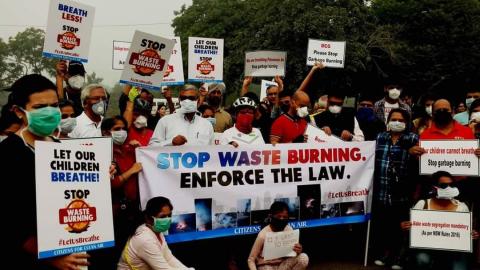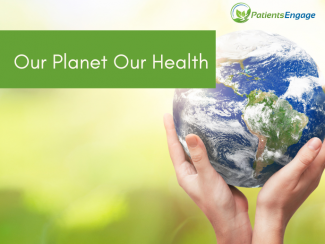
The theme for World Health Day 2022 is Our Planet, Our Health. It is a time to understand how environmental issues and specifically air pollution is affecting our health and how we can be part of the solution. We spoke to doctors and local and global clean air advocates to understand the long term effects of pollution and the steps each one of us can take.
How is pollution affecting health of people, especially the vulnerable children and elderly?
Jeffery K Smith, Clean air advocate says:
Air pollution has no boundaries. The World Health Organization (WHO) estimates that air pollution causes 7 million premature deaths every year. 99% of the world population lives in places exceeding WHO air quality guidelines/levels.
Air pollution is the leading cause of death for children worldwide. The World Health Organization estimates that air pollution killed ~600,000 children in 2016. Children under five years of age made up 8% of all air pollution-related deaths in 2016. Most children under 15 are exposed to PM2.5 levels that exceed WHO guidelines.
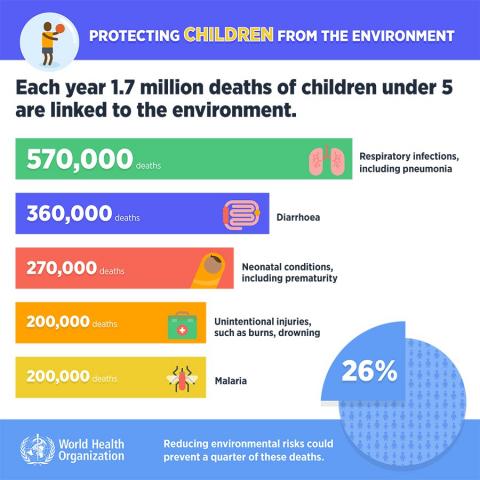
Early exposure to air pollution increases the risk of developing asthma and other lung diseases both presently and later in life. Air pollution exposure often stunts lung growth and slows brain development, potentially causing ongoing cognitive disability.
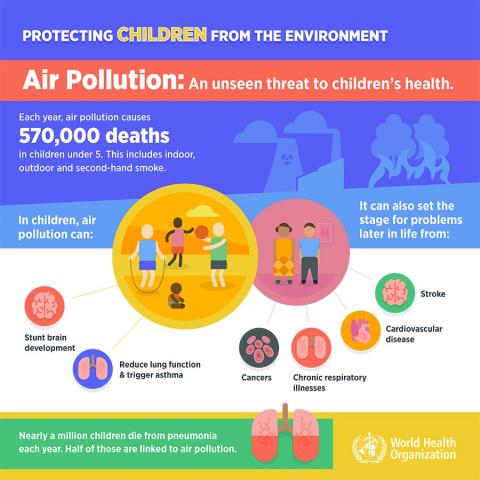
Air pollution damages children's health while still growing and can lead to lifelong health issues. Children are closer to the ground than adults. As a result, they are also much closer to exhaust pipes and inhale many more pollution particles.
Dr. Sanjay Mehta, radiologist in Delhi NCR adds:
What we breathe matters. COPD is the largest killer now, especially in northern India. Over my 3 decades of experience I have observed a significant decay in AQI (Air Quality Index). Studies have shown microplastics in the blood stream of people in urban areas. If pregnant women inhale polycyclic aromatic hydorcarbons, the effect is seen in the babies they give birth to even after they are no more in a polluted are. We are also seeing impact on neuro-development of children.
Dr. Neetu Jain, Senior Consultant - Pulmonary, Critical Care and Sleep Medicine, PSRI says:
There is increase in out patient visits and hospital admissions due to increase in pollution level. Patients who are usually managing well on medications require increase in medications as well as doses or hospitalization.
My older patients are getting decompensated but age profile of patients is not changing.
Jyoti Pande Lavakare, clean air advocate adds:
Pollution is a slow, silent and under the radar health emergency. It is a Pandemic for which there is no vaccine. It affects people in every which way and it affects everyone in India. PM2.5 bypasses the body's natural defenses and travels through every organ. It triggers so many diseases in our bodies through the dirty air that we breathe. And children are compromised the most because they are affected even before their lungs are fully formed. And of course the elderly people, whose immune systems are already compromised.
Every negative health harm that smoking causes, is caused by air pollution. Air pollution triggers an inflammatory response and oxidative stress much like smoking. India has extremely high levels of air pollution through the year peaking at unseen levels more than anywhere in the world. There are definitely more and more people getting affected, and as research shows the patients are getting younger.
Ruchika Sethi, founder member, Shona Chatterji and Kavita Bansal, member CFCA:
Our two civil society groups ;Why Waste Your Waste and Citizens For Clean Air (CFCA) were formed because residents noted the detrimental impact on human and environmental health due to civic deficiencies and unsustainable development.
Apart from the increasing landfill site, reckless dumping of construction and demolition waste, there is rampant burning of all kinds of waste including E waste and plastic waste which release harmful toxins into the breathing zone. There is non compliance to construction norms throughout the city adding to both emission and dust pollution.
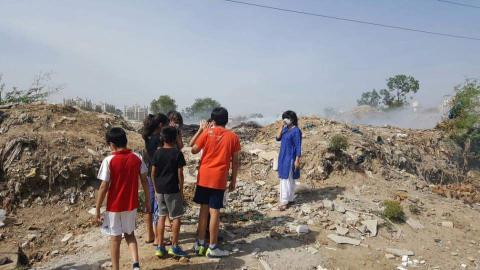
The impact of this is seen in the increasing number of respiratory ailments amongst children, senior citizens as well as young adults as experienced by our members. Increasing number of our members are seriously contemplating moving out of the city to escape the poor air quality round the year. Quite a few have already relocated.
What are the 3 steps we need to take for a Healthier Tomorrow?
Jyoti Pande Lavakare:
The 3 steps that I think that we need to take for a healthier tomorrow: Clean air, clean water and clean soil . They are all interlinked and we need to focus on these to lead healthier lives.
Dr. Neetu Jain
1. Decrease vehicular emission and move to vehicles which don't consume traditional fuels
2. Ban and find alternatives to stubble burning
3. Last but not least education followed by life style changes.
Ruchika Sethi, Kavita Bansal, Shona Chatterji :
First of all public at large is quite disconnected to environment health impacting human health. The first step would be for the government and all stakeholders to make citizens aware of this fact.
Secondly we need to build cities in a way that prioritise environment health and therefore human health.
Thirdly at our own individual level we should practice waste minimization which begins with informed consumerism and supporting companies which work with a high environment sustainability quotient. Also a very simple practice of adopting a 3B_Ka_Funda (see poster), this helps eliminate a disposable culture and reinforces best sustainable practices such as reuse and reduce.
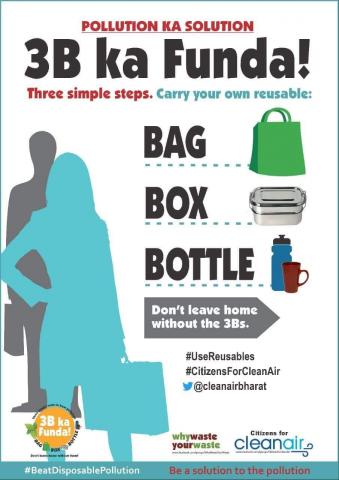
Jeffery K Smith on what can parents do
Parents must not burn firewood at home if they can afford other heating. Parents should require that schools and playgrounds not be located near: idling vehicle engines; congested traffic; businesses with combustion engine delivery, service, and retail customer vehicles; factories; power plants; or municipal waste management facilities (incinerators and landfills).
Parents can engage with each other and form groups and coalitions to share preventative actions to reduce the health impacts. Parents should demand that their community leaders sponsor, participate in, and encourage broad collaboration among various organizations. Communities must share air quality monitoring and related health alerts in real-time (e.g., school flag programs). Parents' and citizens' groups can influence community and city leaders to take active measures to reduce sources of air pollution emissions.
Contributors:
Dr. Sanjay Mehta, Radiologist, Artemis Hospitals
Dr. Neetu Jain, Senior Consultant - Pulmonary, Critical Care and Sleep Medicine, PSRI
Jeffery K Smith, Senior Advisor for Global Clean Air at the Ella Robert Family Foundation.
Ruchika Sethi, founder member Citizens For Clean Air, Kavita Bansal and Shona Chatterji, member CFCA
Jyoti Pande Lavakare is an independent financial journalist, author and clean air advocate. She has co-founded ‘Care for Air’ which works towards building awareness for air pollution health harms.
